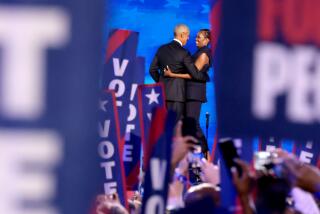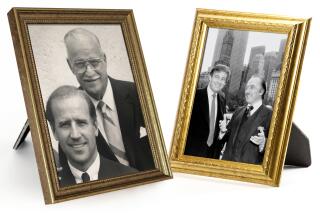So alike and yet so different
- Share via
NAIROBI, KENYA — During an emotion-packed visit to his father’s homeland in 2006, Sen. Barack Obama took time from family reunions and official visits to chastise Kenya’s government for failing to stem corruption and tribalism, irking his hosts in the process.
It wasn’t the first time an Obama had taken Kenya’s elite to task. Forty years earlier, a rising star named Barack Obama -- tall, elegant and impeccably dressed -- attacked the nation’s post-independence government, accusing leaders of betraying their ideals and replicating the nepotism of departing colonialists.
“It must be something in our family,” observed a smiling Said Obama, younger brother of Obama Sr.
Although the lives of father and son scarcely intersected beyond a few letters and a 1971 visit in Hawaii when the younger Obama was 10, friends and family see similarities in the men’s charisma and eloquence, even if their lives took dramatically different turns.
Both achieved success at a young age. Both advocated change. And both displayed a self-confidence that friends described as bordering on cocky.
“The father was full of life, ebullient and arrogant, but not unpleasantly so,” recalled Philip Ochieng, a former drinking buddy of Obama Sr. and veteran Kenyan journalist.
“But in many ways, the son is quite the opposite. He has self-control. The ambition is controlled. And he has a more sober mind.”
The elder Obama was one of Kenya’s most promising sons, rising from the goat pastures of a western village to the study halls of Harvard, eventually taking a coveted spot among the nation’s post-colonial government leaders.
He often introduced himself as “Dr. Obama,” though there is no record of him completing a doctorate. He was a heavy drinker, ordering straight scotch by the “double double,” or four shots at a time. Beer, he said, was a “child’s drink.”
He is best remembered for his booming baritone, which intimidated opponents and charmed women, friends said.
One of those was Ann Dunham, who met Obama Sr. while both were studying at the University of Hawaii in 1959. They separated a few years later when Obama got a scholarship to Harvard, leaving Dunham to raise their son, Barack Jr.
Sen. Obama has spoken often of the effect of his father’s abandonment. At first, he said, it pushed him to try to live up to the expectations of an absent, almost-mythical figure. Later, as he learned the details of his father’s troubled life, he said that it propelled him to try to make up for Obama Sr.’s shortcomings.
“He was a brilliant guy,” Obama told biographer David Mendell, “but in so many ways his life was a mess.”
Despite his ambition and talent, the elder Obama’s career disintegrated amid external forces and personal weaknesses, including the alcohol problem, which led to a string of car accidents. A crash in 1982 took his life.
Friends and family say his career imploded in part because of his brash personality and an idealistic belief, nurtured in America, that the best ideas and smartest people would always rise to the top. Confronted with the reality of corruption and cronyism in Kenya, Obama sank into disillusionment and despair.
“To that extent, he was naive,” said his friend Peter Aringo, a longtime member of parliament from Obama’s home village. “He thought he could fight the system from the outside. He thought he could bring it down.”
Instead, it brought him down.
From a young age, Obama was the village’s pride. His father was a respected chieftain, known as one of the first in his Lake Victoria village to befriend British colonialists, learn English and adopt their style of dress. (As a boy, upon hearing stories that his grandfather was a village chief, Sen. Obama envisioned his father as an African prince, he wrote in his 1995 autobiography, “Dreams From My Father.”)
After excelling in school, Obama Sr. moved to Nairobi, the capital, where he caught the eye of Tom Mboya, one of Kenya’s founding fathers. Mboya selected Obama and about 80 other students to send on scholarships to U.S. universities in a 1959 “airlift” in anticipation of Kenya’s independence in 1963. The students included Wangari Maathai, who became the first African woman to receive the Nobel Peace Prize.
“There was so much excitement during that time,” recalled Mboya’s widow, Pamela, one of those on the trip. “We were going to the U.S. to be educated so we could come back and take over, and that’s exactly what we did.”
In Hawaii, Obama wooed and married Dunham, the progressive only child of Kansas parents. The interracial relationship raised alarm on both sides of the family; their son was born Aug. 4, 1961.
Obama Sr. left Dunham and Barack Jr. after winning a graduate scholarship to Harvard; he enrolled in September 1962, records show. Family members say Obama Sr. could not afford to take his new family but felt he could not pass up the chance to attend one of America’s best universities.
In addition, Obama apparently failed to tell Dunham that he’d never divorced his first wife in Kenya, who was raising their two children. He and Dunham divorced in 1964.
At Harvard, he began another relationship, with schoolteacher Ruth Nidesand, who followed him to Kenya.
Friends said Obama’s relationships with women were a product of the time and his culture.
“In America, that might be a shocking thing, but in Africa it was not that unusual,” said former Ugandan Foreign Minister Olara Otunnu, who knew Obama Sr. in the late 1970s.
In a 2006 speech in Nairobi, Sen. Obama speculated that his father was unable to reconcile his African roots with the Western ideals he’d come to respect. “He related to women as his father had, expecting them to obey him no matter what he did,” he said.
At Harvard, Obama Sr. thrived in the academic setting, earning a master’s degree in economics with a focus on econometrics, a mathematics-based specialty used in forecasting. He became a fixture in bars in Cambridge, Mass., chain-smoking in his signature black-rimmed glasses.
Nearly 30 years later, his son would become the first African American president of the Harvard Law Review.
The elder Obama returned to Kenya full of hope and expectation, but problems emerged in the government almost immediately as the nation’s first president, Jomo Kenyatta, began rewarding members of his Kikuyu tribe with land tracts, loans and plum jobs.
For Kenyans schooled during the United States’ 1960s civil rights movement and expecting the birth of a new Africa, coming home was difficult.
“In developing countries, it is always the brightest people who suffer the most,” said Fredrick Okatcha, a professor at Kenyatta University who knew Obama Sr. in the U.S. “They are regarded as rebels.”
Obama Sr., who got a job as a government economist, had little patience for politics or aptitude for diplomacy, publicly contradicting superiors, belittling co-workers and exposing fraud.
Once when a senior official proudly proclaimed a government-funded highway had been completed, Obama interrupted to say he’d visited the area and work had not begun.
“He had no fear,” Otunnu said. In academic journals, Obama lambasted government policies in impassioned essays.
Government bosses labeled him a troublemaker.
In addition, Obama was from the rival Luo tribe, complicating matters. As President Kenyatta consolidated his power, Luo leaders were shuffled aside. Mboya, Obama’s mentor and a fellow Luo, was assassinated in 1969.
Obama’s worsening drinking binges strained his career and marriage.
“He would pass out on the doorstep,” said Leo Odera Omolo, a former drinking buddy and friend of the family. “Ruth would complain he’s getting out of hand.” The couple divorced in the early 1970s.
He was injured in several alcohol-related car accidents, including one in 1965 that killed a passenger, a recently engaged postal worker who was a friend from Obama’s hometown.
“Barack never really recovered from that,” Omolo said.
The accidents also tarnished Obama’s reputation. “Because he was so highly educated, people treated him like a king. Now, they were gossiping for the first time about his behavior.”
In 1971, Obama visited Hawaii to see his son. In his memoir, the senator describes a tense, monthlong visit during which his father taught him some African dance moves, impressed his classmates and squabbled with his mother one night over whether their son should study, as his father wanted, or watch a holiday airing of “How the Grinch Stole Christmas!”
The father returned to Kenya brimming with pride and told friends that he wanted to bring his son to the country.
“He showed me pictures and said, ‘Look, my son is a bull now,’ ” Omolo said.
But his career descent accelerated, culminating in his losing an important promotion, Aringo said. That sparked years of on-again, off-again stints at various government ministries. Sometimes he’d be fired, but usually he quit in disgust.
“He felt the whole system was corrupt,” Aringo said. “He would call and say, ‘I can’t stand it anymore. Let’s get a drink.’ ”
Friends began to keep their distance. Walgio Orwa, a professor at Great Lakes University in Kisumu, said the man he first met in the United States when both were students was unrecognizable when Orwa later saw him in the 1970s.
“Before, he was everyone’s role model,” Orwa said. “With that big beautiful voice, we all wanted to be like him. Later, everybody was asking what happened.”
On Nov. 24, 1982, as he drove home about 11 p.m., Obama’s car ran off the road and crashed, according to the Nairobi Times.
He was 46, the same age at which his son became the first African American to clinch a major U.S. party’s presidential nomination.
--
More to Read
Get the L.A. Times Politics newsletter
Deeply reported insights into legislation, politics and policy from Sacramento, Washington and beyond. In your inbox twice per week.
You may occasionally receive promotional content from the Los Angeles Times.









